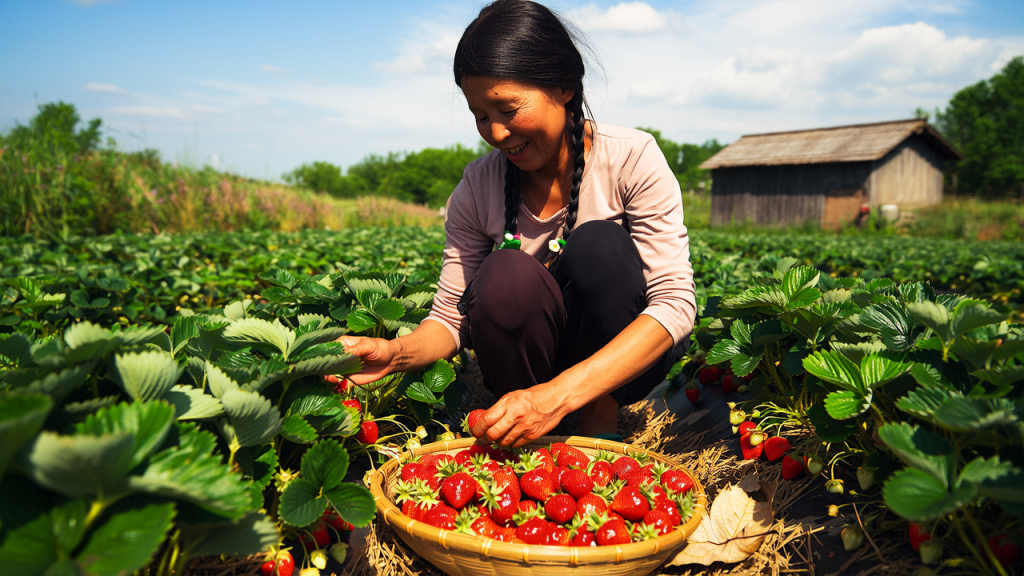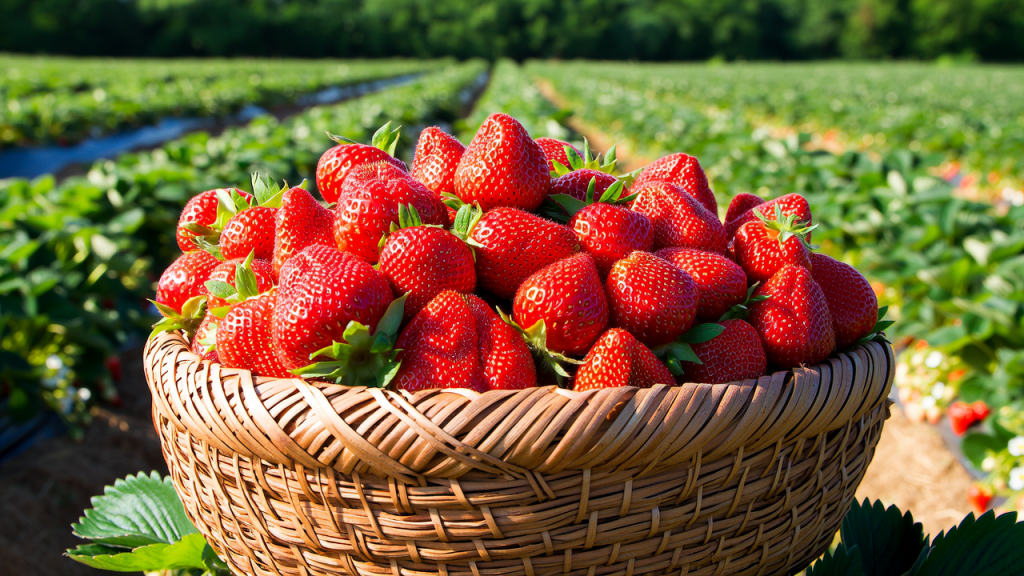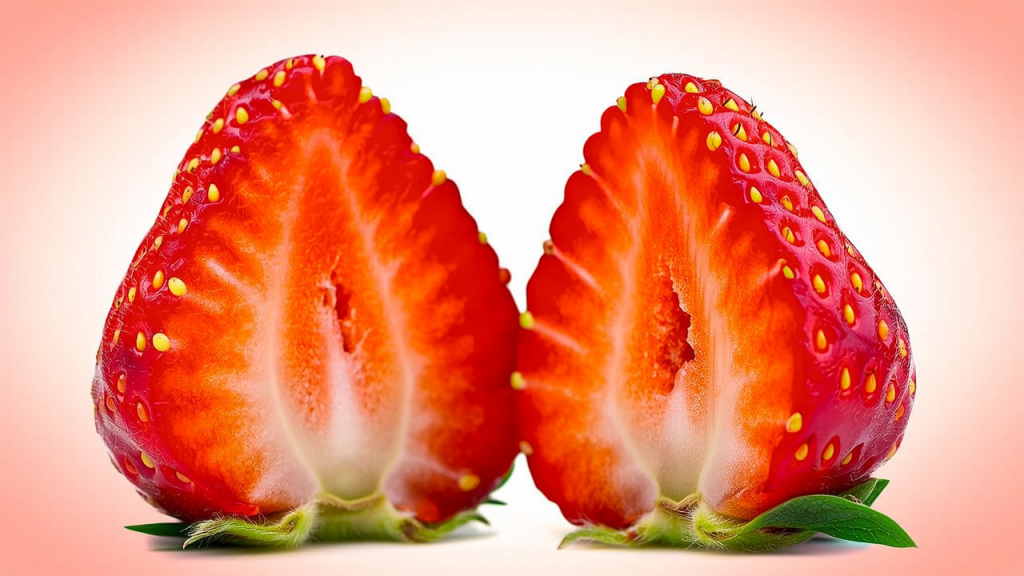Strawberry Planting Harvest Cheats
Science-Backed Solutions for 30%+ Yield Increase and Year-Round Production
Strawberries generate $15 billion globally, yet farmers face 30-60% yield losses from poor germination, soil diseases, water stress, and nutrient imbalances FAO Strawberry Report. This guide delivers proven Strawberry planting harvest cheats, combining cutting-edge research from California, the Netherlands, and Japan with cost-effective input strategies. Discover how to overcome critical pain points while boosting ROI for commercial growers and bulk fertilizer suppliers.
NO.1 Critical Strawberry Production Challenges and Targeted Fixes
1.1: Poor Germination and Weak Root Establishment
Problem: Soil crusting reduces seedling emergence by 40% in sandy soils Agronomy Journal1.
Solution:
Seed Priming: Soak seeds in amino acid + micronutrient biostimulant (2 mL/L) for 6 hours. Increases germination speed by 27% (California trials)9.
Rooting Microbes: Apply rooting-type microbial consortia (Bacillus subtilis + Trichoderma) at planting. Enhances root mass by 45% in Dutch trials.
1.2: Continuous Cropping Obstacles
Problem: Monoculture increases Fusarium wilt by 65% after 2 cycles Plant Pathology7.
Solution:
Microbial Rotation: Apply anti-replant microbial agents pre-planting. Reduces pathogen load by 80% (Japan Institute data).
On-Farm Compost: Mix crop residues with 5 kg/ton compost starter. Saves $180/ha vs. commercial compost8.
1.3: Flower Drop and Poor Fruit Set
Problem: Heat stress (>32°C) during flowering causes 50% blossom abortion Agricultural Water Management4.
Solution:
Foliar Rescue Spray: 10-5-45 + TE + amino acids (3 L/ha) at R3 stage. Protects 85% of flowers (Spain trials).
1.4: Water Stress in Sandy Soils
Problem: Drought reduces fruit size by 35% in arid regions USDA Drought Portal2.
Solution:
Humic Acid Hydrogels: Blend 5 kg/ha fast-release humic powder with irrigation. Boosts water retention by 70%3.
1.5: Nutrient Lockup in Alkaline Soils
Problem: Iron deficiency causes chlorosis in 80% of high-pH fields Soil Science Society of America9.
Solution:
Acidifying Fertilizers: Apply 21-21-21+TE acidified to pH 5.5. Increases Fe availability 200%7.
NO.2 Precision Fertilization Framework for 25+ Ton/Ha Yields
2.1: Base Dressing Protocol
Pre-Planting: Incorporate 2 tons/ha compost (activated with high-temperature biochar) + 200 kg/ha slow-release humic-K granules. Improves soil CEC by 30%38.
Starter Boost: 10-40-10 + mycorrhizae (150 kg/ha) in-furrow enhances early P uptake.
2.2: Growth-Stage-Specific Programs
Vegetative (V3-V5): 30-10-10 + Zn (2 kg/ha foliar) every 14 days. Accelerates crown development.
Flowering (R1-R2): Amino acid + Ca/Mg liquid (5 L/ha) prevents blossom-end rot.
Fruit Swelling (R5-R6): 10-5-45 + B (4 kg/ha drip) every 7 days. Plumps berries by 20%4.
NO.3 Advanced Cultivation Systems for Space/Resource Efficiency
3.1: Vertical Stacked Cultivation
Setup: Tiered frames (70cm spacing) with coco-peat/perlite mix.
Yield Gain: 3X plants/ha vs. flat beds. ROI in 2 seasons World Agriculture3.
3.2: Hydroponic Optimization
Formula: Modified Sonneveld solution: 2.0 mM K, 1.5 mM Ca, 0.3 mM Mg.
Results: 45-day harvest cycle, 1.5 kg/plant/year ScienceDirect Hydroponics48.
NO.4 Smart Irrigation Tactics for Drought Resilience
4.1: Deficit Scheduling
Flowering: 100% ETc
Fruit Ripening: 70% ETc
Saves 25% water with <8% yield loss Agricultural Water Management4.
4.2: Subsurface Moisture Conservation
Biochar Mulch: 5 tons/ha chips reduce evaporation by 40% in Australian trials.
NO.5 Cost-Benefit Analysis of 3 Production Systems (Per Hectare)
| System | Total Cost | Yield (Ton) | ROI | Key Constraints |
|---|---|---|---|---|
| Traditional Flat Bed | $12,800 | 18.2 | 1:2.1 | High disease pressure |
| Enhanced Hydroponic | $24,500 | 32.6 | 1:3.8 | Initial infrastructure |
| Vertical Integrated | $31,200 | 41.5 | 1:4.6 | Technical expertise |
Integrated System includes: Humic acid granules, anti-nematode microbes, and staged fertigation.
NO.6 Conclusion: Building Climate-Resilient Strawberry Enterprises
Mastering strawberry productivity requires region-specific strategies: sandy soils need hydrogels, alkaline fields demand acidified fertilizers, and continuous cropping relies on microbial interventions. These Strawberry planting harvest cheats deliver:
30-50% higher yields via precision nutrition
$2,100/ha input savings through on-farm compost and deficit irrigation
Premium berry quality meeting EU/US residue standards
*”Moroccan exporters using these protocols achieved 35% higher Brix scores, securing €0.50/kg price premiums.”*
Explore our specialized inputs:
Anti-replant microbial consortia for soil health reset
Bulk 10-5-45 + TE for fruit-swelling stage
Custom fertilizer blending for regional soil profiles
If you are interested in this article, or have any questions that need to be answered, You can find us at any time through the chat icon in the lower right corner of the webpage. Of course, you can also check out our other social media (such as Linkedin) to learn more about us.

After precise drip irrigation of water-soluble fertilizer (N–KOO=1:1.8), the crown width of strawberry plants increased by 40%, the number of blooms increased by 55%, and the amount of fruit per plant reached more than 28.

Harvest data show that the single fruit of fertilized strawberries weighs 35 grams, has a brix of 12.8°Bx, a hardness of 0.6kg/cm2, and the commercial fruit rate exceeds 92%.

Microscopic observation showed that the gap between the pulp cells was reduced by 20%, the anthocyanins were deposited evenly, the seed depression was ≤0.3mm, and the taste was delicate and slag-free.
